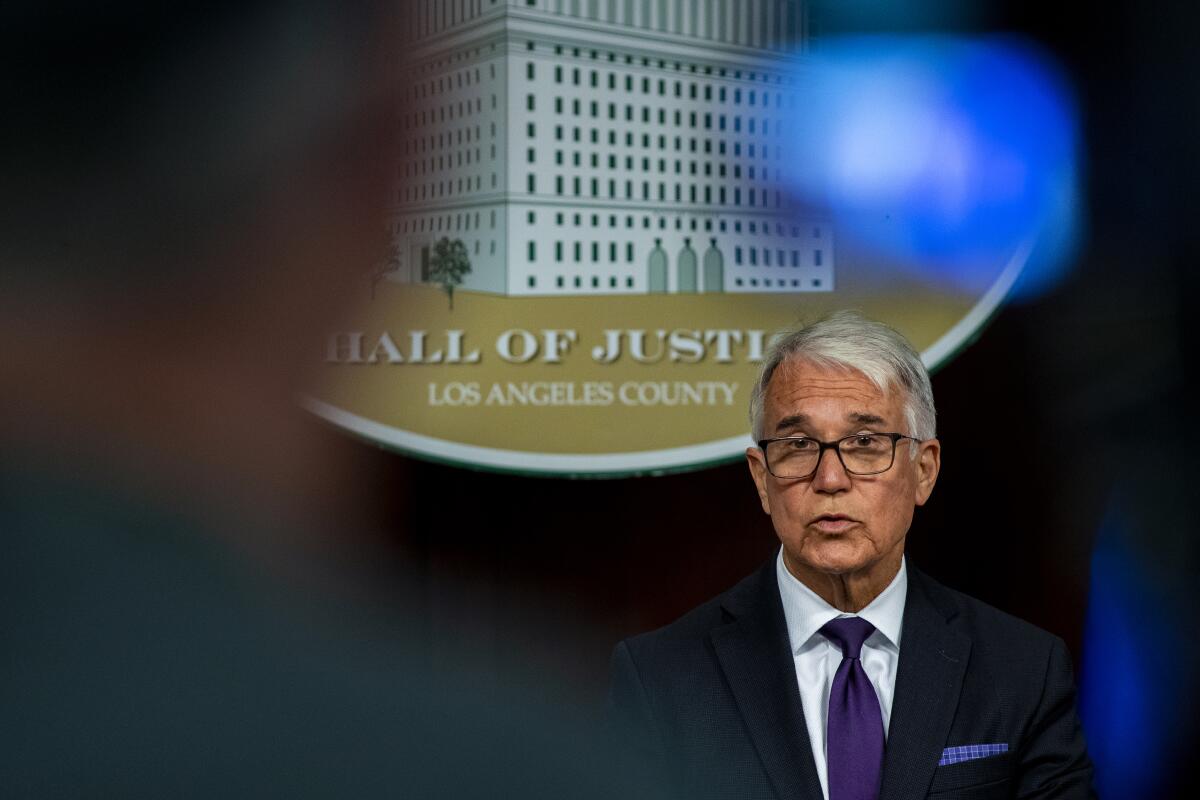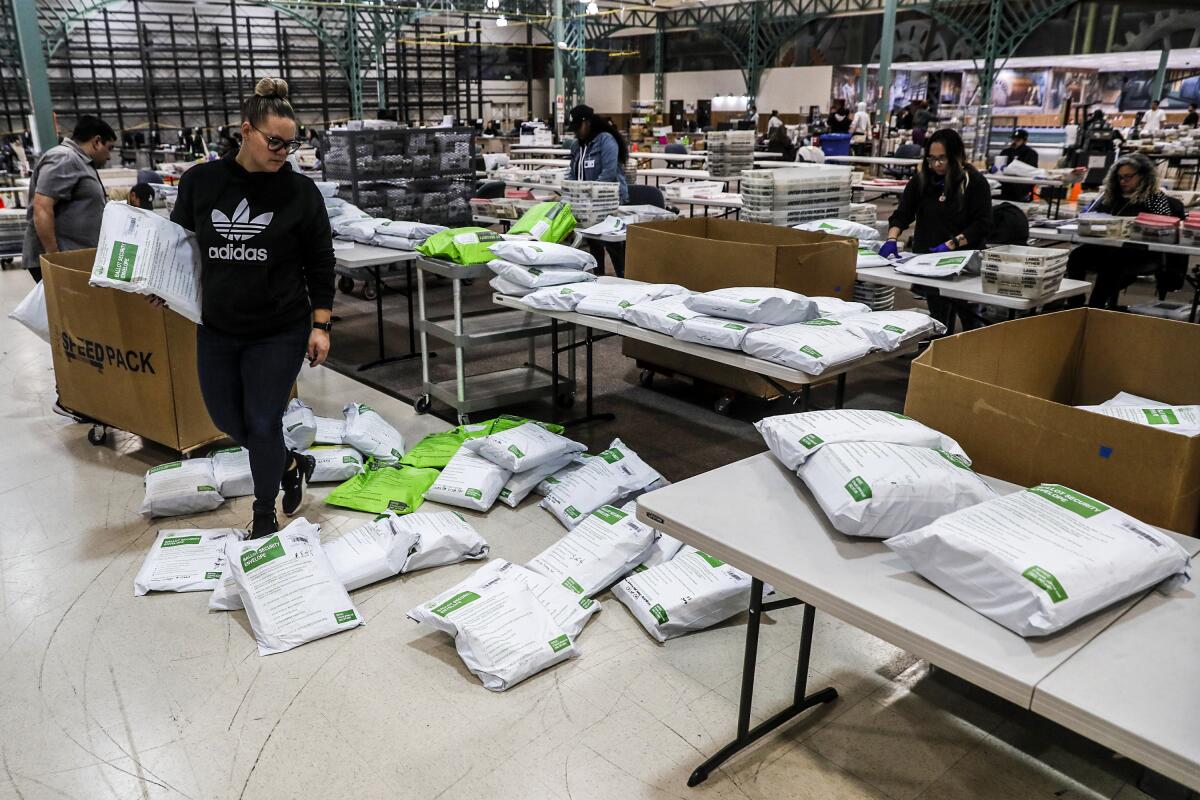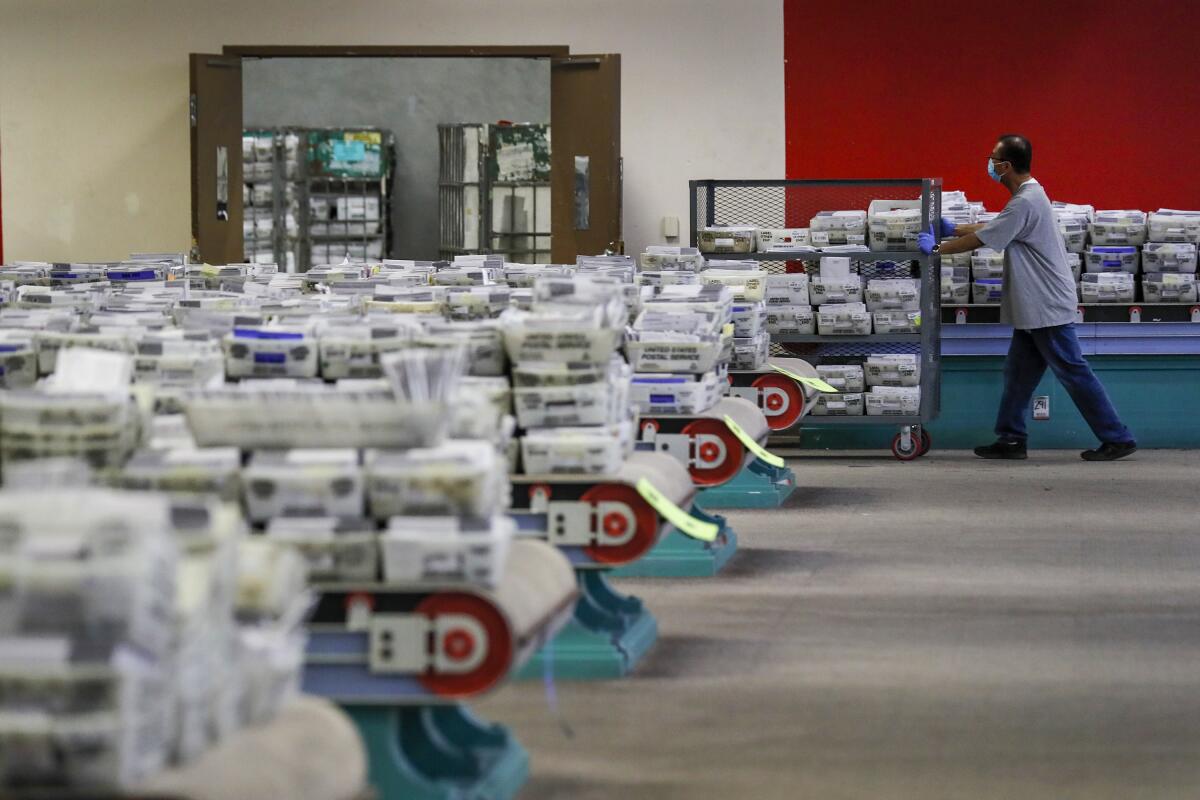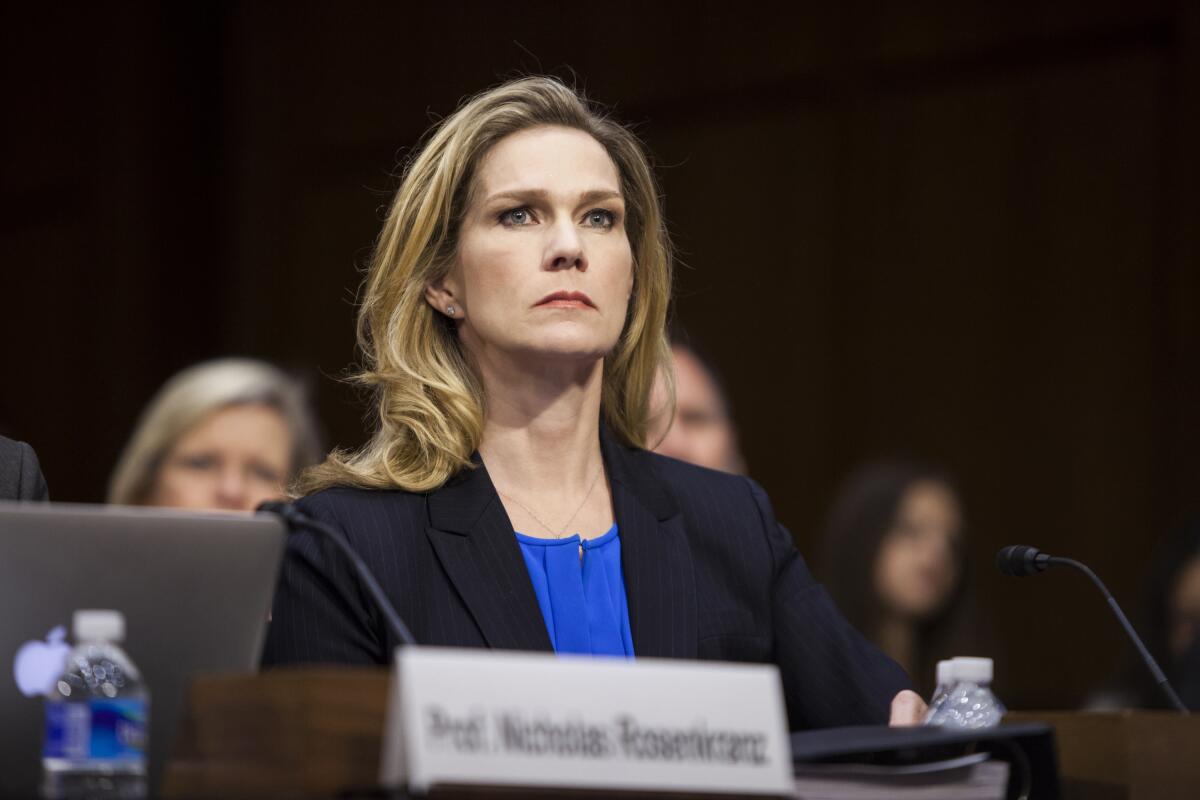How did Gascón end up launching a criminal probe sparked by far-right election conspiracy theories?

- Share via
More than a dozen QAnon adherents rubbed shoulders with conservative journalists and bloggers at an undisclosed Phoenix location in August, gathering to hear new allegations from a far-right group convinced the 2020 election was stolen.
Dubbed “the Pit,” the event was hosted by True the Vote, a group of election deniers who funded and appeared in the long-debunked propaganda film “2000 Mules” by right-wing provocateur Dinesh D’Souza, which purported to prove that then-President Trump lost his bid for a second term because of coordinated ballot box stuffing by Democrats.
Rising GOP star Kari Lake, Arizona’s Trump-backed candidate for governor this fall who repeatedly questioned election integrity in her failed campaign, gave opening remarks at the event, which was livestreamed. Organizers claimed they had new information that was exponentially worse than what was reported in the film.
Attendees were led in prayer by an unidentified man who asked God to extinguish “this Marxist spirit, this communist spirit that’s trying to destroy our nation and destroy our families” with the hope that those behind such a force “would hang on the own gallows that they built.”
Participants learned about open-source tools to help ferret out information about purported election fraud, and then the livestreams were turned off. In the hours that followed, the dozens of people in the room heard a presentation on what True the Vote leaders christened the “Tiger Project,” unveiling allegations that U.S. election information was being stored on servers in China. The audience was urged to go forth and spread the word.
Among the crowd was an investigator for the Los Angeles County district attorney’s office.
The presence of a detective from one of the country’s most liberal prosecutor’s offices at an event promoting MAGA conspiracy theories was mystifying. But it was just one of a series of questionable actions that has won Los Angeles County Dist. Atty. George Gascón unwanted and unexpected praise from Trump and his allies in recent weeks, and shoved a little-known Michigan software developer into the crosshairs of fringe true believers.
The investigator was seeking information about Konnech, a tiny software company based in Okemos, Mich., whose PollChief software is used by election officials in several major cities to register and schedule poll workers. For months, True the Vote had alleged it had evidence that an American company was working at the behest of the Chinese government to influence U.S. elections. The August event was the first time the group identified the company.
True the Vote leaders have acknowledged on far-right podcasts that they have presented similar claims about Konnech to law enforcement agencies before. But only Gascón’s office has pressed charges.
Gascón’s office and True the Vote declined to answer a number of specific questions for this story, citing active court proceedings.
In the months following the Pit event, Gascón became an extraordinarily unlikely backer of some True the Vote claims, echoing in an Oct. 14 news conference the group’s allegations that Konnech stored poll worker data overseas. Ultimately, he charged Konnech Chief Executive Eugene Yu with embezzlement of public funds, alleging that Yu violated a portion of Konnech’s contract that required L.A. County poll worker data to be stored only in the United States.

Subscribers get exclusive access to this story
We’re offering L.A. Times subscribers special access to our best journalism. Thank you for your support.
Explore more Subscriber Exclusive content.
When he announced Yu’s arrest, Gascón offered scant details and accused him of storing the Social Security numbers and home addresses of poll workers on Chinese servers. He didn’t say what crime had been committed, who had been harmed or why the head of a 21-employee company would send election-related data overseas.
Gascón sought to hold the 65-year-old without bail in Los Angeles, more than 2,000 miles away from his home, but a judge later granted house arrest. Death threats were made against Yu and his family, according to court records, and several counties ended their contracts with Konnech because of the charges.
All of it was seemingly for nothing. On Nov. 9 — the day before prosecutors would have to fight off a motion to dismiss all charges against Yu — Gascón quietly dropped the case, saying in a statement that his office needed months to properly review all available data linked to Konnech. It was the day after the midterm elections.
Litigants who have claimed Trump was robbed of the presidency in 2020 through widespread fraud have been routinely defeated in court over the last two years. But Gascón’s decision to launch a criminal probe based on True the Vote’s allegations, along with the failure of his office to articulate what Yu actually did wrong, created a vacuum easily filled by disinformation.

Though Yu was never charged with an election-related crime and Gascón repeatedly said the alleged misconduct had no impact on ballot counting, the conservative media ecosystem grabbed ahold of the investigation and spun its findings into fodder for conspiracy theorists. The far right, and even Trump himself, hailed the progressive district attorney’s allegations as vindication of their unfounded warnings about criminal tampering in U.S. elections.
At the initial news conference, Gascón said Konnech’s alleged storing of poll worker information overseas was a violation of the company’s $2.6-million contract with the L.A. County Registrar-Recorder/County Clerk’s office. He also said the worker information had not been stolen by anyone in China or otherwise compromised. He did not acknowledge True the Vote’s role in the investigation, though prosecutors later confirmed that a report from True the Vote co-founder Gregg Phillips sparked the inquiry.
In a criminal complaint filed a week later, prosecutors charged Yu with conspiracy and embezzlement, claiming the violation was tantamount to the theft of public funds.
L.A. prosecutors alleged in their complaint that Konnech employees “sent personal identifying information of Los Angeles County election workers to third-party software developers who assisted with creating and fixing” PollChief software.
Those developers were based in China, which was a violation of the contract, according to the complaint. A project manager for Konnech also said Chinese administrators working on PollChief had “‘superadministration’ privileges for all PollChief clients,” according to the complaint. It is unclear what such privileges entail. The complaint made no mention of data being stored overseas, and prosecutors have not said why.
In court, Deputy Dist. Atty. Eric Neff claimed without evidence that the data breach was one of the largest in American history.
Less than a month later, prosecutors moved to drop the case without prejudice.
“Mr. Yu’s good name was tarnished by false narratives from fringe conspiracy theorists who bragged about enlisting Los Angeles prosecutors to further their political agenda,” said Gary Lincenberg, Yu’s lead defense attorney.
Tiffiny Blacknell, Gascón’s chief spokeswoman, said in a statement that the office was concerned about the pace of the investigation and potential bias in the presentation of evidence. A new cybersecurity team and an outside expert will reassess the data, she said.
“We currently have an immense volume of digital data that will define this case, but the processing of that data will take months. We would not be able to fairly and accurately process and present all of that evidence within the statutory time frames,” she said.
Blacknell declined to answer most questions from The Times, citing the ongoing investigation.
She defended Gascón’s decision to go public with the charges.
“We knew that the arrest of Mr. Yu would quickly become publicly known and it could raise suspicion about the security of the election. We also knew that some members of the public would worry that votes were stolen or miscounted — which has never been at issue — or have legitimate concerns about data privacy,” she said, adding that much of the information Gascón provided at the news conference came from “employees closest to this investigation.”
Blacknell’s statement indicated that office leadership found problems with the evidence after the arrest was announced.
“During the course of this prosecution, upper-level management became aware of irregularities in how the case was presented,” she said.
A week after this story published, Neff, the lead prosecutor, was placed on administrative leave, according to three sources with knowledge of the situation. Blacknell said she could not comment on personnel matters.
In a filing seeking to dismiss the case that was set to go before a judge Nov. 10, Lincenberg wrote that the district attorney’s allegations were “at best, a civil breach of contract claim.” Lincenberg argued that the entire filing rested on the provision in the 150-page contract between L.A. County and Konnech that required poll worker data be kept on U.S. servers.
“These facts do not make out an embezzlement charge, and the complaint should be dismissed,” Lincenberg wrote. He added that prosecutors suggested that “Mr. Yu can be prosecuted for embezzlement based on Konnech’s failure to comply with a data security provision of its contract with the County Registrar.”
“No California court has ever upheld an attempt to prosecute this type of civil contract claim as criminal embezzlement,” Lincenberg wrote.
Blacknell said the prosecution’s theory was that Yu had committed theft by embezzlement or false pretense by converting property of the registrar’s office for his own use, and defrauded the county by violating its contract.
The L.A. County Registrar’s office did not stop using Konnech’s software, even as Gascón publicly claimed the office had been the victim of a crime. Mike Sanchez, a spokesman for L.A. County Registrar-Recorder Dean Logan, told The Times prosecutors never provided evidence that Yu stored data overseas.

But election officials in Detroit, Fairfax County, Va., and other counties did end contracts with Konnech because of the charges.
Yu’s defense team also argued that the district attorney’s case was misguided and sparked by a source of information acting in bad faith: True the Vote.
While Gascón did not mention the group during his initial news conference, Phillips claimed that same day he played a “small role” in the case.
Blacknell later said that while a report from Phillips did prompt the investigation, the district attorney’s office conducted its own review of the evidence before making a filing decision. A different spokesperson for the office, Matthew Krasnowski, told the Huffington Post that True the Vote played no significant role in the investigation beyond the initial tip. True the Vote leaders have characterized the relationship differently, saying in public and under oath that they had multiple interactions with investigators and prosecutors over the summer. The group has also confirmed the presence of an L.A. County investigator at the Pit.
Neither Blacknell nor Krasnowski responded to questions from The Times about sending an investigator to the Pit.

True the Vote director Catherine Engelbrecht has promoted election fraud conspiracies for more than a decade, becoming an increasingly prominent voice in conservative circles. She has not provided evidence backing up her allegations, and local election officials have been unable to verify her claims.
She and Phillips, who served in state government posts in Texas and Mississippi and joined Engelbrecht’s efforts in the mid-2010s, weren’t widely known until after the 2016 election. At that time, Trump promoted Phillips’ baseless claim that more than 3 million votes had been cast by noncitizens for his Democratic opponent, Hillary Clinton.
True the Vote’s claims shot into the far-right zeitgeist this year after the May premiere of “2000 Mules,” which featured Phillips and was bankrolled by the group.
The film is based on True the Vote’s widely debunked allegations that Democratic “mules” packed drop boxes across the country with fraudulent ballots, stealing the 2020 election from Trump. The film prompted people to stake out ballot drop-off locations in the 2022 midterm elections, including in Arizona, where a federal judge issued a restraining order to limit the ability of armed, far-right “watchers” to surveil and intimidate voters.
True the Vote has refused to produce evidence backing up its claims, rebuffing requests from the Arizona attorney general and the Georgia Bureau of Investigation, among others.
Soon after “2000 Mules” was released, True the Vote leaders began talking about another purported scandal they claimed to have uncovered, alleging that the Chinese Communist Party had the ability to control U.S. elections.
Phillips told a judge in a defamation case brought in September by Konnech in Texas that Neff first contacted him about the claims in July. Neff referred all questions to Blacknell.
Engelbrecht also testified in that case that she spoke with Neff and the office investigator who was present at the Pit about “open-source information that we had at that point on Konnech.”
True the Vote spokesman Brian Glicklich said the group was unable respond to questions from The Times because of a restraining order filed in the Texas case.
Engelbrecht and Phillips leveled an array of allegations at Konnech, describing the company as part of a “Red Chinese communist op run against the United States,” according to Konnech’s filing in Texas.
The group alleged that Konnech provided the personal information of more than 1.8 million poll workers to the Chinese government in an effort to influence U.S. elections, according to the federal defamation lawsuit. Konnech denied those claims.
“Konnech has never managed customer data for 1.8 million poll workers, or even a small fraction of that number,” the company’s Texas lawsuit read.
Konnech said in the suit that its proprietary PollChief software is used by more than 20 elections offices nationwide to aid in “recruiting, training and scheduling poll workers; coordinating the distribution of equipment and supplies to polling places; and dispatching support personnel.” The software is not involved in voter registration or counting ballots, the company has said.
Engelbrecht and Phillips urged Pit participants to help them dig up more information on Konnech, providing them with an in-depth dossier that included the company’s contracts with various counties obtained through public information requests, background information on Yu and his companies obtained through public searches and information about websites connected to Konnech hosted by servers in China. The Times has reviewed a copy of the file, which did not include any personal information for poll workers such as Social Security numbers.
Phillips told the court in the Texas case that someone in the L.A. district attorney’s office had “recently” accessed the identifying information that he saw, but did not offer specifics.
In September, Phillips bragged on the QAnon-supporting podcast “MatrixxxGrooove Show,” or “MG Show,” that he’d gone back and forth with “a particular county in California” and saw “some huge potential coming out of that.”
Engelbrecht and Phillips have provided multiple accounts in public and under oath of how True the Vote accessed Konnech’s data, who helped the group and whether it ever had physical possession of the information. In the Texas defamation case, they told the judge that a third-party contractor brought the data to Phillips and then passed it on to the FBI. They claim to have no way to contact that person and did not independently verify that Konnech had servers storing American poll worker data in China.
“They don’t even know if it was a Konnech computer that was accessed,” Konnech’s attorney Constantine Pamphilis said during a hearing in Texas last month. “After all of this, they don’t even know. Meanwhile, these statements they’ve made are destroying my client’s company, and they’re trying to destroy Mr. Yu as well.”
Engelbrecht and Phillips were held for a week in a Texas jail for contempt of court because they refused to disclose the names and contact information for other people they claim participated in accessing Konnech’s data. The U.S. 5th Circuit Court of Appeals ordered them released last week while it considers whether the group should remain subject to the restraining order enjoining it from accessing or using Konnech’s data.
After the Pit event, Engelbrecht and Phillips’ claims about Konnech were perpetuated by far-right media figures on conservative podcasts, in videos and on social media. But it was Gascón’s early October filing that moved the allegations against Yu and his company into the broader public eye.
“Gascón could be a National hero on the Right if he got to the bottom of this aspect of the Voting Fraud, that is, after all, his job. He could change his image of being weak and ineffective overnight. He would be a hero throughout our Country,” Trump wrote.
Many of those criticizing Yu and Konnech in right-wing media inaccurately describe Konnech as handling “election data” or “voting data,” and have mischaracterized why True the Vote’s leaders were jailed.
Conservative commentator Charlie Kirk claimed online that Yu’s arrest was proof of “another election integrity ‘conspiracy theory’ confirmed.” Fox News personality Tucker Carlson said on Nov. 5 that Phillips and Engelbrecht were jailed because they “alleged voter fraud in the last election.” Glicklich said Engelbrecht and Phillips were jailed for not disclosing who gave information to the L.A. County district attorney.
Election conspiracy theorists’ amplification of the claims against Konnech echoes their embrace of unfounded claims in the 2020 election about poll workers mishandling ballots and problems with Dominion Voting Systems election machines. Dominion has filed multiple defamation lawsuits against Trump allies, including Fox News, who cited the company by name in repeating his false claims about 2020 election fraud.
“Conspiracy theorists will spin anything to confirm their beliefs,” said Alexandra Cirone, an assistant government professor at Cornell University who studies misinformation online. “There is a huge disinformation narrative on social media about how U.S. elections can’t be trusted, when we know the truth is the exact opposite — the U.S. has no systemic issue with electoral fraud.”
Queally reported from Los Angeles and Wire reported from Washington.
More to Read
Get the L.A. Times Politics newsletter
Deeply reported insights into legislation, politics and policy from Sacramento, Washington and beyond. In your inbox three times per week.
You may occasionally receive promotional content from the Los Angeles Times.












